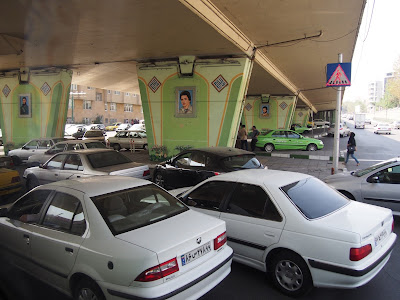What People Think They Know About Iran
When I said that I was going to Iran, most people's gut reaction was to tell me not to go. Our media has done such a good job of portraying Iran as a monster (Axis of Evil! Nukes!) that it's not hard to understand why they reacted this way, but I am naturally skeptical of such broad and bold statements, and many things I'd read had led me to believe that the reality was quite different. Honestly, this was a big part of the draw for me - I wanted to see for myself what Iran was really like.
After spending two weeks traveling around Iran and talking to people I can say unequivocally: Iran is not what you have been taught to think.
It's dangerous/ it's at war - This one is the most frustrating because it is patently untrue. There is no fighting going on Iran and there hasn't been since the Iraq-Iran war ended in the '80s. ISIS/ISIL is in Iraq and Syria, and Iran is a strong opponent in the fight against ISIS - perhaps our most important Middle Eastern ally in this fight, although neither the U.S. or Iran can actually admit to that (and of course it gets complicated, as Iran backs the Assad regime in Syria).
 |
| Judith wearing chadoor (a sheet worn over your clothes) to enter a Sufi shrine. We were only required to wear chadoor twice on the trip, at two holy sites. |
 |
| A friendly imam at a mosque in Isfahan. |
 |
| Shiite prayer stones. They use them so that their foreheads touch a piece of earth during prayer (now that mosques are carpeted). |
 |
| These two heard us speaking English and were excited to practice theirs - they're applying for graduate study programs in the US and Britain. |
 |
| Making new friends at a Persian Garden |
 |
| Plum stew with chicken, rice with barberries and sesame seed flatbread. |
 |
| Tombs of ancient Persian kings carved into huge walls of rock. |
 |
| Dome of a mosque in Esfahan. Iran has some of the most beautiful Islamic architecture in the world. |
The biggest risk I encountered traveling in Iran is getting hit by a car trying to cross the street in Tehran - seriously, these drivers are crazy.
2) Shiite Islam is actually a more relaxed/moderate form of Islam compared to Sunni (especially Wahhabism, the sect of ISIS and Saudi Arabia). Shiites in Iran pray 3 times day (instead of 5). I was quite disappointed to learn you rarely hear the call to prayer unless you're near a mosque - unlike Dubai, there are no loudspeakers in malls or public areas telling everyone it's time to pray. No one in Iran is legally required to go to the mosque or to pray, ever. That said, the Supreme Leader is an Islamic Imam who ultimately has great power over the country's policies and politics and he tends to be very conservative.
It's not a good place to travel - Iran doesn't have as much tourist infrastructure as some places and can be challenging if you don't speak Farsi, but it's worth the effort (on your own or with a tour). So much history, delicious food, friendly people, striking desert landscapes, super cheap (except maybe for accommodation ) - and despite buses full of German and Chinese tourists, it still feels relatively undiscovered.
The takeaway
None of this is to say that Iran is a perfect place. It certainly has its issues - political, social and economic. But what I really want to be the takeaway from all of this is that Iran is not so very different from the U.S. or any other country I've been to: most people are friendly and good and welcoming - and of course a few are not. There are liberals and conservatives and everything in between and oftentimes none of them are happy with the government. Regardless of politics, they are incredibly proud of their culture and history and love sharing it with others. And they are hopeful for a peaceful and prosperous future for their children and their homeland. Just like the rest of us.





Comments
Post a Comment